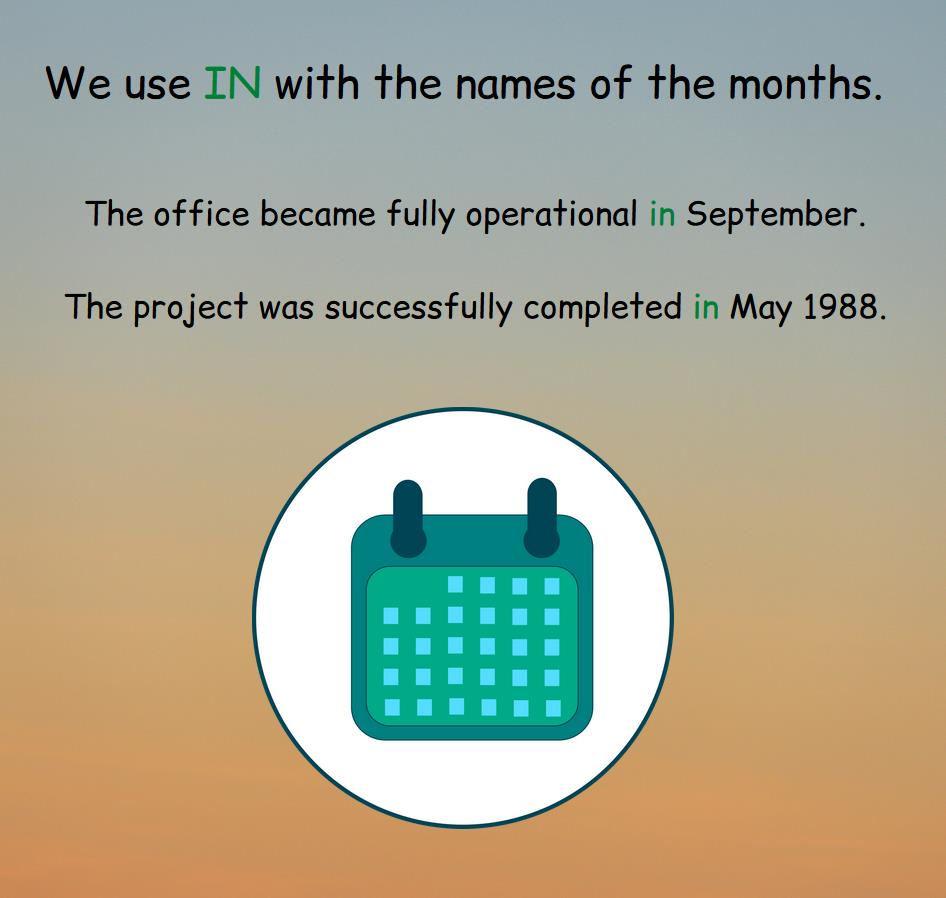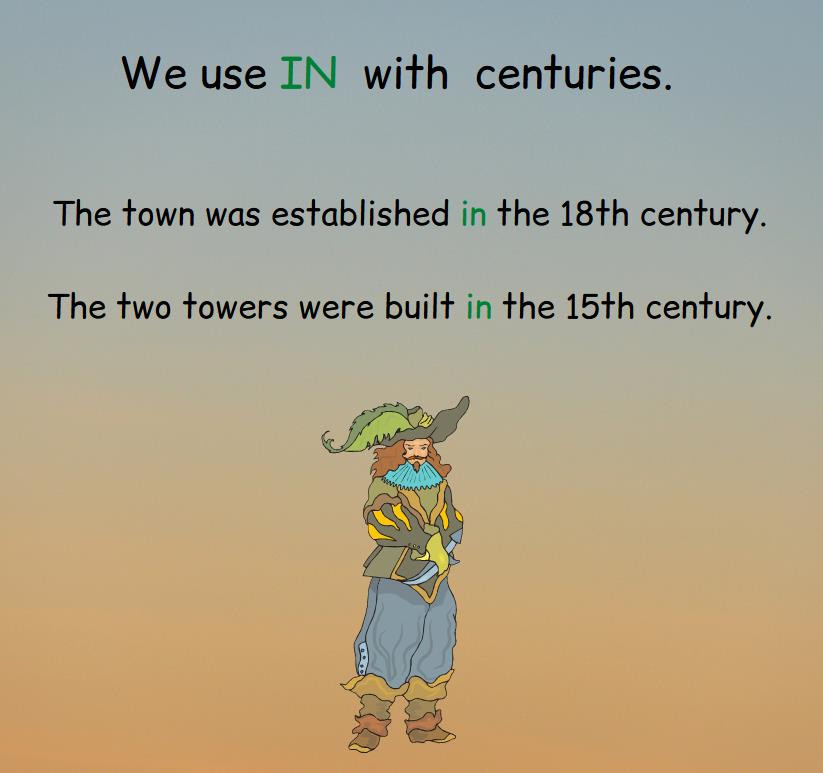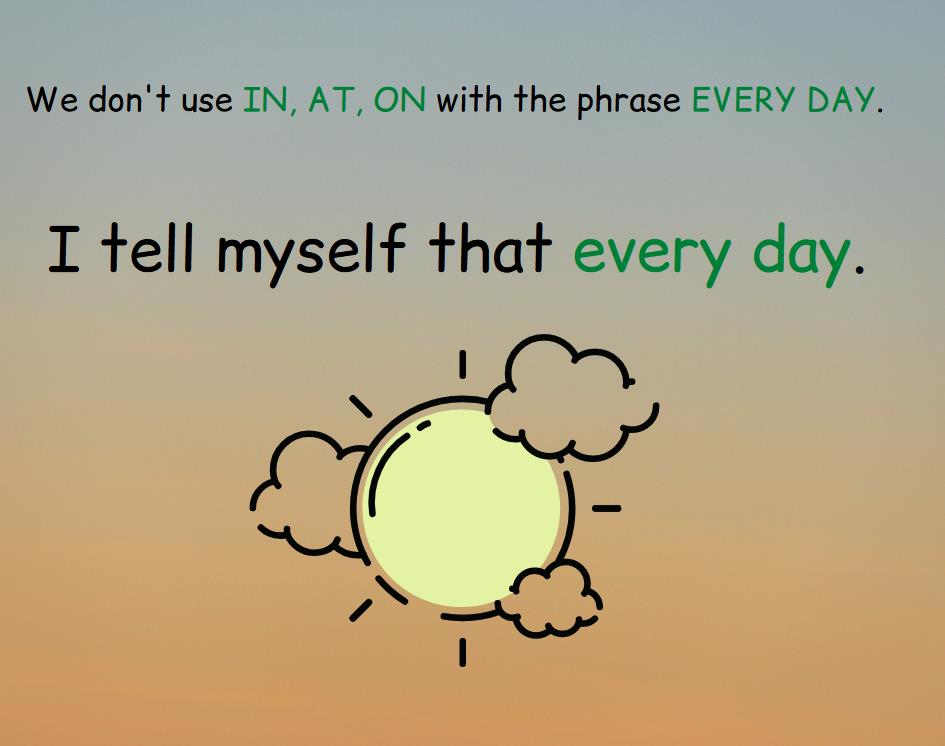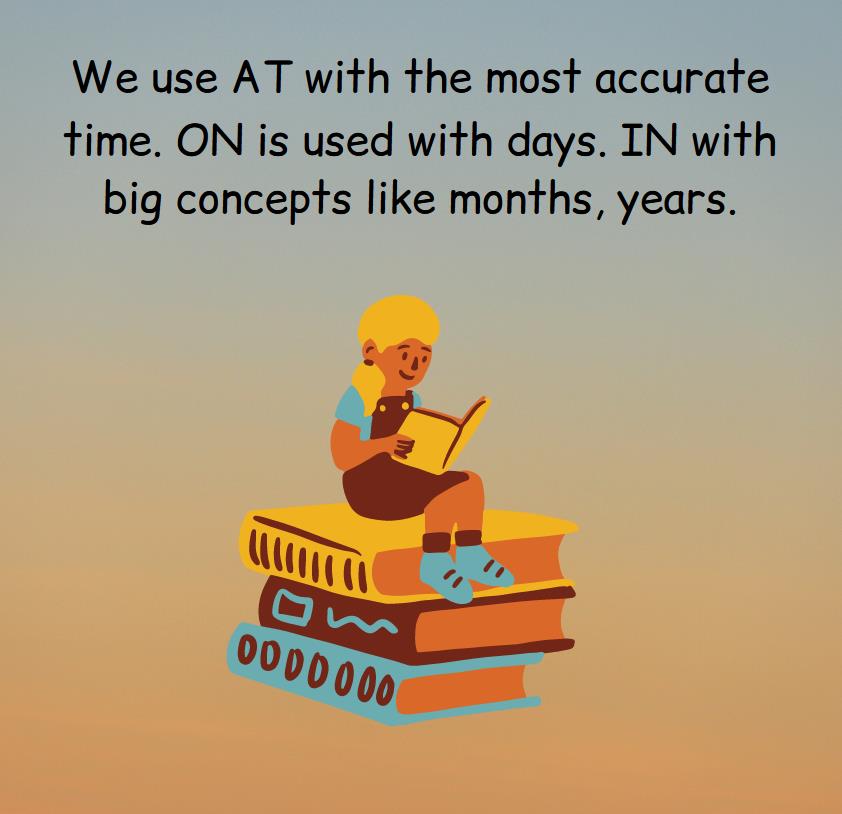We often use the Prepositions of Time At In On in English. Therefore, English learners often confuse when and in what cases these prepositions should be used correctly.
To improve your knowledge of this subject, let’s only talk about the Prepositions of Time: At, In, On specifically.
Preposition At
We use the preposition of time at when we want to specify the exact time.
I asked her to call me at five o’clock.
The mayor’s called a press conference at five o’clock.
He was released at 8 p.m. that same evening.
This decision takes effect at noon today.
I’ll wait for you at noon at Central Station.

We also use at with the word time.
I’m not entirely sure this is appropriate at breakfast time!
I’m not always home at dinner time.
I feel exploited and proud at the same time.
My father used to read to me at bedtime.
I might be dying and falling in love at the same time.
We use the preposition at with the names of different holidays.
You look taller than you did at Easter.
I’ll bring the kids out at Easter.
We might come back at New Year, all of us together.
Got anyone to kiss at New Year’s?
I hope I can see you at Christmas.
I am sorry, I won’t be here at Christmas.
But when we talk about holidays with a specific day in mind, we use the time preposition on.
We went to chapel three times on Christmas Day.
We’ll see what Santa brings on Christmas Eve.
I cannot work on Christmas Eve.
I always cry on my birthday.
In order to indicate the age of a person, we use the preposition of time at.
Do you want her to have a baby at 18?
He eventually left home at 17.
Well, at 22, I was very lucky.
She wrote her first poem at the age of 13.
He retired at the age of 65.

Preposition In
We use the preposition of time in when we want to denote a period.
There’s a train in two minutes.
We were out of there in two minutes.
I think I can repair the car in a week, maybe less.
Relax, she’ll be back in a day.
You can have your job back in a couple of years.
In a few months we will all be one family.
You’ll be able to travel in a few days.
We use both at and in to indicate the time of day. For example:
- at night
- in the afternoon
- in the evening
- in the morning
I heard him yelling at night.
If he doesn’t drink in the morning, he will now.
Yes, he’s asked to see me in the morning.
The meeting ended at three in the afternoon.
He promised to cut down to three bottles of champagne in the evening.
I don’t serve dinner in the evening.
We use the time preposition in with the names of the months.
The office became fully operational in September.
They announced their separation in September 2020.
The project was successfully completed in May 1988.
Changes were introduced in May 1998.

We also use the time preposition in with the names of the seasons.
I met her when she transferred in the summer.
This information will be available in the summer of 2018
I was in London once in the winter.
These clothes will be sold in spring.
I train a lot, especially in the winter.
The popular garden restaurant is open in summer.

We also use the preposition in when we name a year.
The famine in 1988 cost a quarter of a million lives.
I was born in 1988 in York.
Her parents divorced in 1990 when she was only 14.
He was selected for the astronaut program in 1990.
We use in along with centuries.
The town was established in the 18th century.
It was done in the 17th century by an Italian surgeon.
Turgenev was born in the 17th century in the Russian Empire.
The two towers were built in the 15th century.

Preposition On
We use the preposition on with the days of the week.
You can hear it on Thursday if you want.
Please call me after his checkup on Thursday.
We also use the preposition on when we form the phrase day of the week + part of the day. These are phrases such as:
- Monday morning
- Saturday night
You left home on Monday morning.
I noticed it was missing on Monday morning.
I know where he will be on Thursday night.
You can be in the show on Thursday night.
All right, we’re heading out on Saturday night.
I want to have pizza on Saturday night.
NOTE: colloquially, we may not use the preposition on with the name of the day of the week.
You can be in the show Thursday night.
We use the preposition on with dates.
On the 10th of September last year we turned the machine on for the first time.
He’ll probably show up on the 15th of July.
Prepositions of Time At In On and Some Expressions
To better understand when to use the prepositions at, in, on, look at the following expressions:
- at the weekend
- on the weekend
- at the moment
- in the Middle Ages
- in the past
- in the future
Take a look at examples with these expressions:
I’ll be here at the weekend too.
Listen, I’m going to Edinburgh at the weekend.
Tell Mom I’ll be over on the weekend.
A lot of people come through here on the weekend.
Mum’s not too happy about it at the moment.
You must have had similar situations in the past.

Prepositions of Time At In On: When We Don’t Use Them
The prepositions of time in, at, and on are very popular prepositions in English. We use these prepositions all the time when we talk about time.
But there are some words with which we do not use the prepositions of time in, at, on.
Let’s take a look at a list of such words:
We don’t use in, at, on with the word this:
I thought you guys did great this week.
You’re the fourth therapist to say that this week.
I look forward to visiting both countries later this year.
I was mugged four times this year.

We don’t use in, at, on with the word every:
Trade between the two nations is increasing every year.
I have been watching him every day.
We don’t use in, at, on with the phrase every day.
I tell myself that every day.

We don’t use in, at, on with the phrase every + day of the week:
They used to visit me every Saturday.
He still played football with the lads every Saturday.
We don’t use in, at, on with the word last:
They’re exactly the same as last month.
I wasn’t at the Brandy Library last month.
You should see what they did last year.
She had a nasty divorce last year.
I made him 50 grand last week.
Mom said you went on a date last week.

We don’t use in, at, on with the wrod next:
See you next Monday, at the bar.
Dad will take us on a great outing next weekend.
If it makes you happy to leave next week, we can leave next week.
We can do your thing next weekend.
I was actually feeling a little better the next day.
It will bloom again next year.
You have to attend my wedding next month.

To summarise the above, remember, we generally do not use the prepositions of time on, in, at before words such as:
- Last
- This
- Next
- Every
I ordered it online last week.
They started serving sushi last year.
You only dated Rebecca this year.
The next day the house was empty.
I pay my bill in full every month.
I am sure he has no idea what we go through every month.

Advice: How to understand Prepositions of Time At In On
It can be difficult for beginners to understand which prepositions to use with which words.
Therefore, let’s talk about prepositions in terms of what function the prepositions perform.
We use the preposition at when we want to indicate some exact time. When we indicate exactly when the event occurs.
We use the preposition of time on when we are talking about a specific day. It can be a day of the week, it can be a date or a day of a holiday.
We use the preposition of time in to indicate large periods. Such as, for example:
- Month
- Season
- Year
To summarize, it turns out: We use at with the most accurate time. The preposition on is used with days. And the preposition in with big concepts (months, years).
But you should not completely trust this rule! Because in English there are exceptions to the rules for the prepositions of time at, in, on.
In addition, in the English language, some stable expressions may not be formed according to the rules.

Also, you can read the full article about Prepositions in English.
Hello! If you would like to thank me for the articles I wrote, you can click Buy me a coffee. Thank you! ❤❤❤










